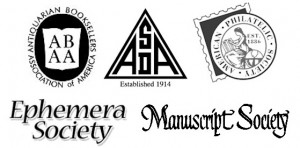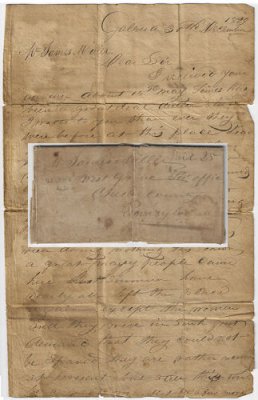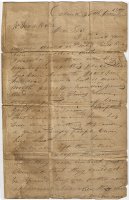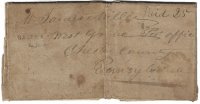Kurt A. Sanftleben, LLC
Joseph Mace
1829 – Letter from an early lead miner encouraging friends to join him in Galena, Illinois via St. Louis where he could receive assistance from the not-yet-famous gunsmiths, Jacob and Samuel Hawkens
List price has been discounted for this show.
SOLD
Item Details
Galena, Illinois, 1829, Letter
Very Good
This stampless folded letter measures 7.75” x 12”. It is datelined “Galena 30th December 1829” and was sent by Joseph Mace to W. James Miller in care of the West Grove, Pennsylvania postmaster. It bears a manuscript “Paid 25” rate mark and a rare typeset postmark that reads “GALENA, ILL” with an indistinct date. (See the American Stampless Cover Catalog, Vol. 1, p. 69.) Complete and legible. Edgewear with minor dampstains and splits beginning along some folds. A transcript will be provided.
In this letter, Mace informs Miller that the Galena lead mining boom has temporarily cooled off but is expected to resume again in the spring.
"Times here has been a good deal duller since I wrote to you than ever they were before at this place. Lead has been down to $1.25¢ per hundred pounds but is now north $2.00¢ per hundred pounds and raising times have every appearance of being good next Spring People that have remained here has been doing nothing this season a great many people came here last summer have nearly all left the place again except the women and they were in such great demand that they could not be spared . They are rather necessary at present but still this would be a good market for a few more. . ..
“I would wish my brother Samuel to come on here next spring if he is not married nor doing any particular Business as I am of opinion that a man that would use industry like you . . . might make a fortune here if not one year he would [in] 2 or 3. . .. I have . . . have not made a great deal but still I am not discouraged . . . as I intend to go in to the mining business my self”
Just as interesting, Mace provides advice regarding travel to Galena from Pennsylvania.
“Tell [my brother] to come to Pittsburg from there to the falls of Ohio on a Steam Boat – from the falls to St Louis and at St. Louis call on Jacob or Samuel Hawkins and either of them will instruct him how to come here. About $25- will fetch him from Pittsburg to Galena provided he takes deck passages on the Stm Boats There is chances at Pittsburg to get wages [on] keel or Steam Boats down to the falls. . .. Tell him to be at Pittsburg against the 20th of March as that is about [when] the river is open. . ..”
Mace made good on his promise to enter the mining business as the Secretary of War reported that in 1842, he owned 40 acres of lead mines in Illinois.
In the late 1780s, the Meswaki tribe, important participants in the fur trade, found they could supplement their earnings by having the women and old men gather small quantities of galena, the most valuable lead ore, from the ground’s surface and sell it in St. Louis along with their hides. In 1788, a Frenchman, Julien Dubuque, received a grant of about 1,400 acres from the Governor of New Spain to mine lead and open a trading post just across the Mississippi River in what today is the state of Iowa.
Following the Louisiana Purchase, the United States government began to promote lead mining in the region, and after George Davenport, a former Army colonel, shipped a boatload of lead to St. Louis in 1816, the Department of War assumed control of the area and began to lease mining claims in 1822. By 1824, steamboats had begun to dock at Galena regularly, and America’s first mining boomtown was born. By 1828, 21 million pounds of lead had been pulled from the ground, and the regional population approached 10,000. It was at the height of this boom that Mace penned this letter.
The Hawkens brothers, who were trained to be gunsmiths by their father in Maryland, had settled in St. Louis around 1820. There, they produced and repaired firearms, tools, axes, tomahawks, gun worms, and sword hilts, all the while developing a hand-made, high-quality, long-range rifle that was light enough to be carried at all times by hunters, trappers, traders, and explorers throughout the western plains and mountains. It is not clear how the brothers and Mace were acquainted; however, this letter was written before their legendary “Plains Rifle” began to take the trade by storm in 1831.
At this time river travel was the only reliable method of travel from the Alleghenies to the Mississippi River, and some who could not afford the cost of tickets worked their way west as boat crew members. Keel boats were narrow pole-driven vessels that transported much of the cargo along the rivers of Ohio and Pennsylvania.
(For more information, see “Julian Dubuque’s Mines” at the National Historic Program website, Kett & Co.’s The History of Jo Daviess County, Illinois, Walthall’s Galena and Aboriginal Trade in Eastern North America, House of Representatives 18th Congress 1st Session Document No.84: Lead-Mines and Mineral Lands Letter from the Secretary of War, Hanson’s The Hawken rifle, its place in history, and Baldwin’s The Keelboat Age on Western Waters.)
At the time of listing, there are no similar personal accounts for sale in the trade that are related to the country’s first mining boom, the importance of lead, the designers of the rifle that opened the West, and river travel; none are reported as having appeared in auction by the Rare Book Hub, or held in institutional collections by OCLC.
A 1930 letter providing genealogical information from a descendant of Joseph Mace will be included.
#10492
Kurt A. Sanftleben, LLC
Kurt A Sanftleben
2129 General Booth Blvd Suite 103-311
Virginia Beach, VA, 23454
United States
Phone: 757-716-3336
Cell: 571-409-0144
Featured Catalogue
Visit Website
Specialities
Paper Americana

More Information
Booth 23
Shipping and Returns
PAYMENT METHODS ACCEPTED - We accept Checks, Money Orders, and Credit Cards (Visa, MasterCard, American Express, Discover) via PayPal. Interbank transfers via Zelle are free and may be necessary for high-dollar-value transactions. Other domestic and international bank transfers may be possible for an additional fee. Institutions, well-established customers, and ABAA members may be invoiced; all others are asked to prepay. INSTITUTIONAL PURCHASES - We appreciate institutional constraints when it comes to complying with fiscal years, acquisition rules, foundation requirements, and donor concerns, so we’re always willing to hold items for a reasonable time for you to meet organizational purchasing, funding, and billing requirements. TRADE DISCOUNTS - We offer reciprocal trade discounts (sale items included) to known book, ephemera, and postal history dealers when paying by check or money order. Dealers unknown to us may be asked to document their status. DOMESTIC SHIPPING - Unless otherwise specified, orders are normally shipped free of charge by our choice of USPS Media, First Class, or Priority Mail. If requested, other shipping (e.g., UPS, FedEx, USPS Express Mail, etc.) shipping is at cost. INTERNATIONAL SHIPPING - Orders are normally shipped at cost via FedEx, USPS Priority International Mail, and USPS First Class International Mail. RETURNS AND REFUNDS - We accept returns for full refund less shipping for any reason provided the item purchased is returned to us within 14 days and in the same condition as sent. Please notify us in advance of any return shipment.
Open Times
If you'd like to discuss any of these items via Zoom, send me an email at [email protected] or a text at 571-409-0144 to set up a meeting.



